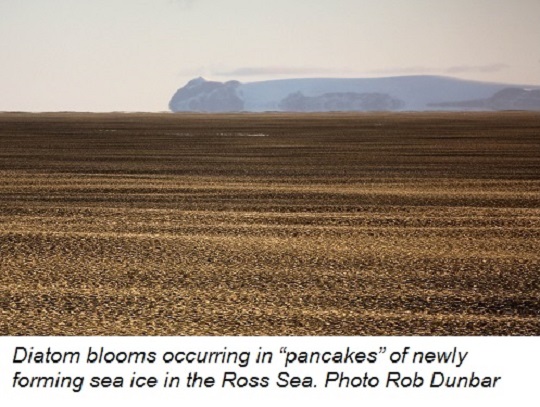Climate change takes a toll on critical marine species
Research from Victoria University of Wellington and GNS Science has revealed that algae critical to the marine ecosystem are sensitive to climate change.

The findings suggest that single-celled marine algae—Antarctic diatoms—are more prone to extinction during major climatic changes and large-scale cooling on Earth. Marine algae form the base of the marine food web, are a crucial element of the cycle of carbon dioxide, and account for about fifty percent of the world’s total biological productivity.
GNS Science and Victoria University paleontologist Professor James Crampton says large-scale cooling millions of years ago stemmed from carbon dioxide fluctuations and changes in Earth’s orbit and tilt.
“Climate does naturally vary a lot and there are swings in temperature over time, and diatom communities can tolerate this general variability. But we found that past a certain threshold of environmental change diatoms are vulnerable and some species become extinct and others evolve.”
The researchers studied diatom fossil records from ocean sediments around Antarctica that date back fifteen million years.
“Over that period diatoms in the Southern Ocean have experienced five major pulses of extinction that are linked with particularly big and sharp temperature swings from warm to cold,” Professor Crampton says.
“By using new analyses of large fossil data sets, we’ve been able figure out accurate times of origination and extinction of the species and resolve what happened in a much finer timescale than was possible previously.
“Our study shows that diatoms were affected by relatively rapid cooling in the past and appear to be sensitive to major changes in the climate system. We suspect that a similar response may occur during intervals of relatively rapid warming.”
The research will be published in Proceedings of the National Academy of Sciences of the United States of America. Professor Crampton worked in collaboration with Dr Richard Levy from GNS Science, Dr Robert McKay, Professor Tim Naish and Rosie Cody from Victoria University, and Professor David Harwood from the University of Nebraska-Lincoln.
“Diatoms are an interesting group to focus on because of their ecological importance—everything in the Antarctic marine ecosystem relies on them,” says Professor Crampton.
“In the future we plan to look at the flow-on effects further up the marine ecosystem and food web, and whether other species that depend on the diatoms to survive become vulnerable as well.”
